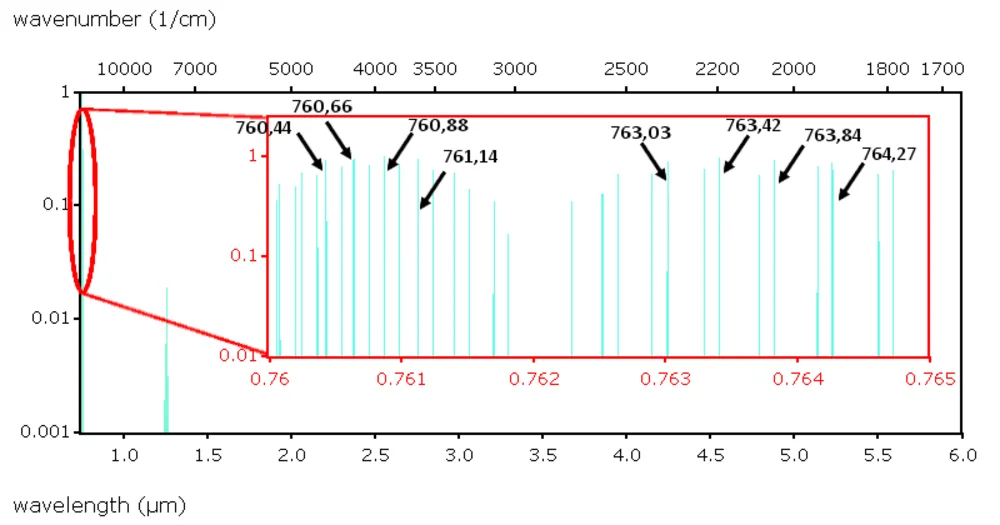

nanoplus lasers detect oxygen in numerous applications, such as in combustion control, power maximization as well as breath gas analysis.
Tunable diode laser spectroscopy allows measuring O2 with up to ppb precision in real time and in situ. Providing long-term stability and requiring little maintenance, nanoplus lasers are suitable for operation in harsh environments.

nanoplus offers various wavelengths to target the vibrational-rotational bands of oxygen. Select the target wavelength that fits your application best.
The literature recommends several options. They are illustrated in the graphic on the right, which shows the relative intensities of the possible absorption lines. To define the most suitable O2 wavelength for your application, you may have a look at our literature recommendations below or refer to the HITRAN database from the Smithsonian Institute.
We present the most common Distributed Feedback lasers for O2 detection below. Learn more about their specifications.

Above wavelengths as well as further customized wavelengths for oxygen detection are available from nanoplus.
When you choose your wavelength, you have to consider your product set up, environment and nature of the measurement.
These factors influence the optimum wavelength for your application. Do have a look at the Hitran Database to further evaluate your choice of wavelengths. Our application experts are equally happy to discuss with you the most suitable wavelength for your application.
Let us know the wavelength you require with an accuracy of 0.1 nm!
We compiled several papers on oxygen detection based on tunable diode laser absorption spectroscopy. Refer to below literature list to read more or select your paper by application.
Child mortality is high among preterm newborn infants. They are often affected by free gas in lungs and intestines, which may lead to the breakdown of vital organs. The current diagnosis is based on X-ray radiography. According to a study a bed-side, rapid, non-intrusive, and gas-specific technique for in vivo gas sensing would improve diagnosis and enhance the babies' chance of survival. The detection method is based on laser spectroscopy
[ 51 ]The maximum power, fuel efficiency and stability of hypersonic aircraft engines depend on the captured air volume. Monitoring the oxygen concentration and velocity are important measures to define the airflow.
Oxygen control enhances process and cost efficiency of incinerators. Oxidation requires excess air. But too much air cools down the combustion and increases the amount of CO in the flue gas. Real-time and in situ monitoring helps to optimize the oxygen content in combustion processes.
[ 157 , 154 , 3 ]If you have any questions on above wavelengths or require advice on making your choice, our experts will assist you. Just email us or give us a call.